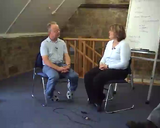what's missing?
I love this question. It is usually easy and obviously useful, but like everything else, not always.
But let's explore the easy beginnings of this question and then we can always add complexities later!
Simply asking "What's missing?" can be so helpful. Sometimes the response to this question is enough for a client to be satisfied.
I recall asking this question to a couple who were in conflict, and they looked at each other with a quizzical look and after some silent time, they began to recall that they used to go out together, for dinner, to the movies ... and they hadn't been doing that. That was enough for them to decide - together - where they might eat, what film, and they life exploring together how they might get back into the habit of this.
Later in the programme we will explore how wonderfully useful this question can be as part of a solution hypnosis session, but for the moment, I invite you to play with the question and any variation that you can come up with, and see what you might discover!
Don't forget to leave a comment so we can share our learning together.





13 comments
Hi rob.. so important.. knowing where you want to go.. the outcome.. the desired result.. and thereafter finding whats missing to help find the way forward.. and possible solutions.. great reminder ..cheers
Question: How to respond if the client says 'What's missing is a non abusive childhood/healthy body (e.g. client has terminal illness)/Mr Right etc?
Possible Answers after gently acknowledging the client's truth/suffering:
Any other ideas/thoughts??
That sounds very beautiful and respectful
Get Outlook for Android<https://aka.ms/ghei36>
To misquote Jay Haley "I'dnever let that be what's missing". It can be helpful to ask a hypothetical question when the clie nt gives us an impossible answer, something like "If you could do that 'a nonabusive childhood/ etc., what would you life look like?" If we than listen to what would be present, we can hear what's missing now. Eg, a healthy body, Mr Right and then ... we can explore how that could be worked towards. This breaks the rigid belief that the present problems are caused by an unchangable past; instead there is an opportunity to create the preferred future. Can you play with this?
Client has many problems but to my surprise she named one that was the most important and that is being able to hold her home tidy. Keep up with clean house, laundry and spoons cups etc. After solving this she could feel happy and satisfied with herself, so I could have never thought about that as I listened to her speak it was such a misery. But I learned that when one problem that she thinks is the most important one can lead to many other changes in her life.
Astra, what a lovely discovery - the client knew so you didn't need to.
I once had a couple. The husband was traumatized from his childhood and the pregnant wife had several times shown up with signs of being treated violently. I gave them both the challenge to do ONE thing differently, no matter what, just one thing, and to tell me about it the next time we met. When they came to me the next time, I was excited to know what they had done differently. The husband started: "We had some beer and was a bit drunk, my wife began to beat me, and then I decided to do something differently: I did not beat her back!". I was really surprised, things weren't like I supposed them to be, the husband was not the violent person I regarded him to be, and the wife not only a victim. That answer gave me hope, the couple saw the pattern, and the husband realized, that he was capable to make changes in his life.
The answer gave you hope, Tove, and also the couple. How wonderful that they were able to start that new way of being with each other.
Actually they did. The husband was a young man in his twenties, who was so traumatized that he hardly slept. He did not dare to close his eyes in the night, because every time he did, flash-backs from his childhood was going on like a movie on the inner side of his eyelids. Of course he was constantly exhausted. I did not dare to work directly with his traumas, because of the risk of pushing him into a psychotic state of mind. But that young main found some resources in himself, and that was his first step to change.
So inspiring, Tove. Thank you.
Karen Levido
Thankyou Rob for the opportunity to learn from you and others submitting questions and experiences while in clinic. Am loving it.
It's such a pleasure to learn together, Karen.
Loving all the wonderful resources for me to learn and grow and the contributions made here with comments are also helpful. Many thanks indeed.
Leave a comment
Please log in or register to post a comment